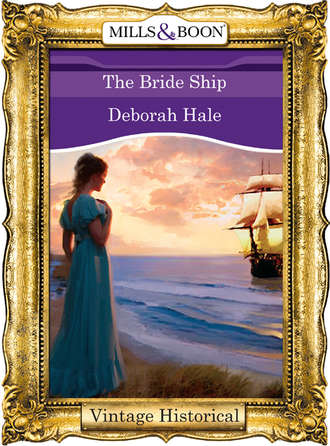
Полная версия
The Bride Ship

“Set sail with your cargo of strumpets for some other lonely colony, where that manner of vice is tolerated. You, and they, are not welcome in Nova Scotia!”
The dazed look fled Jocelyn Finch’s attractive features. An indignant glare took its place.
Unfortunately, it did nothing to detract from her beauty.
Sir Robert wished it had.
“How dare you?” Mrs. Finch wrenched the glove off her impossibly delicate fingers.
She surged up on the tips of her toes and struck him across the cheek with the glove. For such a small scrap of soft kid leather, it stung like the very devil.
“I demand satisfaction for that vile insult, sir!” she cried. “How dare you sully the reputation of me and my charges with your disgusting accusations?”
Then she struck him dumb by asking, “And, pray, when did the state of holy matrimony become a vice in Nova Scotia?”
Praise for bestselling author DEBORAH HALE’s latest books
Highland Rogue
“This is an updated classic with timeless
characters and well-developed humor.”
—Romantic Times BOOKclub
The Wizard’s Ward
“In her first crossover foray into fantasy,
romance writer Hale nicely blends the two
genres in an upbeat, feel-good story.”
—Publishers Weekly
Beauty and the Baron
“Deborah Hale delights with midnight ball, stargazing
and a wonderful cast of characters.”
—Romantic Times BOOKclub
Border Bride
“Excellent characterization and a nicely detailed
Welsh setting give this medieval an intriguing
flavor readers will find hard to resist.”
—Booklist
Whitefeather’s Woman
“This book is yet another success for Deborah Hale.
It aims for the heart and doesn’t miss.”
—The Old Book Barn Gazette
The Bride Ship
Deborah Hale

www.millsandboon.co.uk
This book is dedicated with love and admiration
to two special young men, Brendan and Jamie Hale,
who make the duties of motherhood a true pleasure.
You are my heroes!
Contents
Chapter One
Chapter Two
Chapter Three
Chapter Four
Chapter Five
Chapter Six
Chapter Seven
Chapter Eight
Chapter Nine
Chapter Ten
Chapter Eleven
Chapter Twelve
Chapter Thirteen
Chapter Fourteen
Chapter Fifteen
Chapter Sixteen
Chapter Seventeen
Chapter Eighteen
Chapter Nineteen
Epilogue
Author Note
Chapter One
Halifax, Nova Scotia
May 1818
A n urgent knock on the door of his study distracted Sir Robert Kerr in the midst of drafting his quarterly report to the Colonial Office.
“Come in, Duckworth.” The governor’s pensive squint furrowed into a scowl at the sight of his aide. “Did I not leave instructions…?”
“That you were not to be disturbed, Your Excellency?” Young Duckworth finished Sir Robert’s sentence, as he had a rather annoying habit of doing in moments of crisis.
But this was an ordinary day, of no dire import. At least none of which the governor was aware. Yet his secretary’s boyish face looked flushed and his voice sounded breathless. “So you did, sir, excepting in case of general calamity.”
One corner of the governor’s lips arched in a wry smile as he laid down his pen. His reference to “general calamity” had been meant in jest—something he had never been very good at conveying.
When he rose from his chair, Sir Robert’s neck gave a twinge. He reached back to knead the tense muscles. How many hours had he been hunched over his desk composing that blasted report? Perhaps it would do him good to get up and move about.
“Tell me, what general calamity has beset our fair colony today?” He strode out to the entry hall on the heels of his aide. “Is the brewery on fire? Are we being invaded by some foreign fleet? Has the bishop fallen into the harbor?”
“None of those, Your Excellency.” Once again, Duckworth missed the governor’s attempt at levity. He shoved Sir Robert’s hat into his hands. “I think you had better come and see for yourself, sir.”
With that suggestion, Duckworth turned and fled out the front door of Government House, leaving Sir Robert with little choice but to follow if he wished to appease his curiosity. Grumbling under his breath, the governor jammed on his old-fashioned tricorne. What had put Duckworth in such a stew? And why was he being so confounded mysterious about it?
The pair of sentries who stood guard over the front entrance of Government House were talking together in hushed, urgent tones when he stepped outside. The instant they spotted him marching down the steps, both soldiers snapped to attention.
“One of you stay here. The other come with me.” Sir Robert beckoned the larger of the two men. “I may have need of you.”
“Aye, sir!” the sentries replied in chorus, jumping to obey his orders.
Sir Robert discerned a flicker of eagerness on the face of his escort, and a shadow of disappointment on that of the man ordered to stay behind. In either of their places, his reaction would have been quite the opposite. His former career in the army had taught him to be wary of surprises.
As he marched north along Hollis Street, his old foot wound from the Battle of Corona gave a twinge as it often did in damp weather. He ignored it, reaching up to anchor his hat against the bracing spring wind. He could not afford to slow his pace or he might lose sight of Duckworth, who had just rounded the corner onto Salter Street, which sloped down toward Power’s Wharf. What manner of trouble had washed up with the morning tide?
It seemed Sir Robert was not the only citizen of Halifax curious to find out. Almost as many spectators had thronged onto the wharf as had turned out the year before last to welcome his arrival in the colony.
“Make way!” With belligerent energy, the sentry he’d brought from Government House endeavored to clear a path through the crowd. Either the young solider enjoyed ordering civilians about, or he was eager to get a good view of the proceedings, himself. “Make way for His Excellency, Governor Kerr!”
Bracing himself to meet whatever lay ahead, Sir Robert marched down the quay. He turned his gaze toward Halifax Harbor and beheld…absolutely nothing out of the ordinary.
A small ship had tied up at the wharf, its sails furled, gently rocking on the waves. Sir Robert could make out the name Hestia painted on the prow. The Hestia was sailing under British colors, he noted with a mixture of relief and surprise. That meant it was not a pirate ship, nor did it belong to some foreign fleet.
Why, it looked like any one of hundreds of vessels that arrived here in the course of the year bearing cargo or passengers. What had drawn so many good citizens of Halifax down to Power’s Wharf to watch an ordinary ship unload?
A small flutter of white caught the governor’s eye. Someone standing on the ship’s deck was waving a handkerchief. Sir Robert surveyed the deck more closely. Crowded along the port railing, staring toward the crowded wharf, were a large number of young women. The bright colors of their hats and wraps made a festive contrast to the sober browns and grays of the ship’s hull.
“What in blazes…?” he muttered under his breath.
The wind…or something else…crammed those words back into his mouth.
A woman began to make her way down the gangplank. One of the crewmen offered to assist her, but she shook off his arm and continued on her own, in spite of the precarious sway of the ship. The wind whipped her skirts in a buttery yellow ripple, exposing a pair of shapely ankles.
She walked with the dainty grace of a dancer. Yet her movements also suggested the brisk, determined stride of a general inspecting troops. The paradox unsettled Sir Robert, as did everything else about the situation.
Once she reached the wharf, the woman swept a gaze over the crowd and smiled. At that moment, an obstinate ray of sunshine thrust its way between the fast-scudding clouds to sparkle on the churning water of Halifax Harbor and on the smiling woman in the yellow dress.
The milling, muttering crowd fell silent.
“How charming!” said the woman, echoing the very words that had formed in Sir Robert’s mind about her. “You have arranged a welcoming committee to greet us!”
Before anyone could disabuse her of that notion, she continued, “Of course, you must be vastly relieved to see us at last. I hope you have not suffered any anxiety of our being lost at sea. I must confess, there were moments during our voyage when I feared we might be.”
Sir Robert considered pinching himself. The past half hour had the baffling quality of a dream. Perhaps he’d fallen asleep at his desk while drafting his report and imagined all of this. As he stared at the woman before him and listened to her bewitching voice, he could not help regretting the necessity to wake up and get back to work. Surely it would not hurt to spend a few moments more in a dream that had turned so pleasant.
He stepped forward to get a better look at the woman. “I fear there must be some mistake, madam.”
He bowed over her hand, surprised to discover how low he had to bend. From a distance, her regal bearing had made the lady appear taller. As he leaned toward her, Sir Robert realized how small and delicate a creature she was. It kindled a queer, soft ache in his chest that extended out to his arms. He vaguely recognized the sensation as an urge to protect her, a ridiculous compulsion, since he knew nothing about her—not even her name.
“What manner of mistake?” the lady asked. “We were expected, were we not?” She fixed him with her gaze.
Sir Robert’s cravat tightened around his throat and a wave of dizziness almost made him stagger. What in blazes had come over him?
Never in his life could he recall taking any special notice of the color of a woman’s eyes. Now he could not help but take notice. Hers were a light, lively brown with glints of gold and silver that put him in mind of a speckled trout. Beneath her present look of puzzlement, they seemed to dance with merriment or mischief. Or, perhaps, an answering flicker of the curious fascination that had taken hold of him?
But that was foolishness. He had never been the sort of fellow women looked at in that way. The few ladies who crossed his path seldom bothered to look at all. That was how Sir Robert had always preferred to keep matters—until he’d stared into the eyes of…
“I must confess, madam, I have no idea who you are or what has brought you to my colony.” He wanted to find out, though. Her identity in particular. Hard as he tried to maintain his accustomed indifference to such matters, his mind fairly itched with curiosity.
A look of dismay tightened her delicate features and quenched some of the sparkle in her eyes. Sir Robert found himself wanting very much to spare her any distress.
“Something must have happened to the letter.” She glanced back at the ship. “I suppose we should have waited for an answer before setting out, but the time was growing late. Besides, I felt certain the gentlemen of Nova Scotia would extend us a warm welcome. And you have—far beyond my expectations.”
Those words rekindled her luminous smile, which sent a rush of warmth through Sir Robert.
“I am Mrs. Finch.” She performed an elegant curtsy. “Mrs. Jocelyn Finch.”
The discovery that she was married flooded Sir Robert’s belly with a cold heaviness, as though it were the hold of a ship smashed by a stray cannonball and rapidly taking on water.
Mrs. Finch raised her voice to carry over the muted murmur of the crowd. “It is my pleasure to bring the men of your fine colony a shipload of charming ladies to assuage their loneliness.”
The murmuring around them gained force and volume, like a breaker gathering itself to dash against the rocks.
For a moment the governor stood mute, too stunned by Mrs. Finch’s brazen declaration to reply. If she had upended a chamber pot over his head, Sir Robert could not have felt more sullied or humiliated.
Ever since assuming his position in the colony, he had waged a strenuous campaign against the evil of prostitution, so rampant in garrison towns like Halifax. His efforts had met with scant support. Everyone from the admiral to the Colonial Office back in London seemed to look on the contemptible trade as an unfortunate but necessary support for the soldiers and sailors on duty in the colonies. Rather like the armorers or the quartermaster corps. Even the bishop was tepid in his condemnation of the Barrack Street brothels.
Sir Robert could not share their casual endorsement of a trade that fostered disease, disorder and degradation. If that qualified him as the “stiff-rumped prude” some of his enemies called him behind his back, he made no apology for it. Until now, he had managed to ignore the slights and subtle challenges to his authority mounted by those who opposed him. But he could not ignore this brazen invasion by a shipload of harlots, flouncing into the city under his very nose!
Had the comely Mrs. Finch been meant as a bribe to secure his compliance? The degree to which she tempted him to abandon his scruples outraged Sir Robert.
“Madam.” He fairly trembled with the effort to contain his indignation. “The men of my colony would be better off to suffer a little loneliness than the ills they are likely to incur by consorting with your ladies.”
It gave him a rush of bitter satisfaction to watch her dainty jaw fall slack. No doubt the little vixen had believed him quite smitten with her charms. Instead, she had given him more reason than ever to keep his distance from the fair sex.
“I suggest you get back aboard your vessel.” Sir Robert stabbed his forefinger toward the ship and spoke in a ringing tone of righteous authority. “Then set sail with your cargo of strumpets for some other lonely colony, where that manner of vice is tolerated. You, and they, are not welcome in Nova Scotia!”
The dazed look fled Jocelyn Finch’s attractive features. An indignant glare took its place. Unfortunately, it did nothing to detract from her beauty.
Sir Robert wished it had.
“How dare you?” Mrs. Finch wrenched the glove off her impossibly delicate fingers.
Before Sir Robert could anticipate what she meant to do, she surged up on the tips of her toes and struck him across the cheek with the glove. For such a small scrap of soft kid leather, it stung like the very devil.
“I demand satisfaction for that vile insult, sir!” she cried. “How dare you sully the reputation of me and my charges with your disgusting accusations? How dare you order us away from this colony?”
Before Sir Robert could rally his composure sufficiently to answer, she fired off a final question that struck him dumb again. “And, pray, when did the estate of holy matrimony become a vice in Nova Scotia?”
Her words rocked Sir Robert back on his heels with far greater force than the blow from her tiny glove had done. “Matrimony?”
Mrs. Finch gave a nod of grim, defiant triumph.
“Ma-tri-mony.” She spoke the word again, her tongue and lush lips lingering over each syllable with provocative enjoyment. “Perhaps you have heard of it? A man and woman living together in the state of holy wedlock, having vowed their mutual lifelong devotion?”
Oh, he knew about matrimony. Had he not studied to avoid it ever since he’d grown old enough to contract such an alliance? Marriage distracted a man from his duty while saddling him with further responsibilities. Sir Robert told himself he did not envy Mister Finch his singular distraction of a wife.
Jocelyn savored the bewildered air of the odious man before her. To think her first glimpse of him had made her question whether her heart had truly died upon the battlefield with her darling Ned! The man’s dark good looks and air of distinction had drawn her to him immediately. The modest gallantry of his initial addresses had quickened something inside her that had long lain fallow.
That very favorable first impression had only made his subsequent behavior all the more vexing. She’d been buoyant with pride to proclaim her mission in the colony, foolishly hoping her announcement might provoke a smile from him.
Instead, he’d stared at her as if she were a bit of filth he was anxious to scrape off the bottom of his immaculate boots. No man had looked at her with such contempt since the day her father had cut her off without a farthing for marrying against his wishes.
Then, in front of half the male population of the town, he had denounced her as a bawd-mistress! Recalling the strenuous efforts she had made to protect Vita Sykes’s virtue during their voyage, Jocelyn might have laughed of that preposterous accusation. If she had not been boiling with indignant fury, instead!
Her glove came off almost before she knew what she was doing. If she’d had a male escort with any gumption, he would have called her slanderer out for such an insult. Since she had vowed to make her own way in the world, without the assistance or hinderance of any man, she would have to defend her own honor—and, more importantly, that of her charges.
Just then, she could have cheerfully put a bullet through…
Who was this man, anyway? It seemed indecent, somehow, that he should inflame her emotions to such a pitch in so short a time, without bothering to introduce himself.
While he stood there, momentarily stunned by her counterattack, Jocelyn seized the opportunity to press her advantage. “Furthermore, what gives you the right to declare our ship is not welcome in Nova Scotia?”
Before he could answer, an anxious-looking young man detached himself from the crowd on the quay.
“Begging your pardon, ma’am.” He bowed to her. “This gentleman is His Excellency, Governor Sir Robert Kerr. He does have the authority to order your ship out of Halifax Harbor if he chooses.”
The governor? Jocelyn stared at Sir Robert Kerr in horror. She had just challenged the governor of Nova Scotia to a duel. Could her mission to the colony possibly have gotten off to a worse start?
Chapter Two
S ir Robert’s dream was rapidly turning into a nightmare!
He had publicly slandered Mrs. Finch and all the young women in her charge with the worst insult a man could make regarding a lady’s honor. She had responded by slapping his face and challenging him to a duel in front of half the town. The ugly gossip would set tongues wagging all over Halifax before the town clock up the hill struck another hour!
Would there be any other topic of conversation over local tea tables that afternoon? Sir Robert could picture his opponents consuming such morsels of damaging tattle as though they were rich little cakes iced with gleeful malice.
Worst of all, while the crowd gawked and snickered behind his back, and Mrs. Finch regarded him with a mixture of dismay and disdain, he froze in a way he had never done in the heat of battle.
Had he been a fool to take up this post? The Duke of Wellington’s personal recommendation had touched and flattered him. He wanted to acquit himself well to justify the duke’s faith in him. And to confound certain Whitehall factions who carped at the number of “Wellington’s Waterloo Warriors” being given plum colonial appointments.
But he was a military man, not a diplomat.
Fortunately, young Duckworth rallied to his support. “It would seem explanations are in order, Mrs. Finch, but this is hardly the proper time or place for them. Is it, Your Excellency?”
That was all the prompting Sir Robert needed. “No, indeed,” he snapped. “This is not a matter to be debated on a public wharf.”
He turned to the sentry he’d brought from Government House. “Disperse this crowd at once. Surely some of them have duties they ought to be attending.”
How Sir Robert wished he’d issued that order the moment he had arrived!
Under cover of the soldier’s enthusiastic bellows for everyone to move along and their buzz of annoyance at being deprived of an amusing spectacle, Sir Robert addressed himself to Mrs. Finch. “I think you had better come along with me to Government House, madam, where we may review your situation in private.”
His invitation came out sounding like an order, which he was far more accustomed to issuing.
Mrs. Finch turned back toward the ship. “May I bring the girls along? After the rigors of our voyage, they are anxious to get dry land under their feet again, poor dears.”
Sir Robert could not afford to let their plight arouse his sympathy. “I’m afraid that will not be possible.”
If he let them disembark before he’d decided how to deal with the situation, what was there to stop them from melting off into the town and getting up to unthinkable mischief? “Until this matter is settled, the young ladies and your crew must be confined aboard.”
“Confined?” Jocelyn Finch spun to face him again, her fine dark brows drawn together in an indignant frown. “As if they were a pack of criminals? I have never heard of such a contemptible lack of hospitality!”
“May I remind you, madam,” Sir Robert warned her in a tone he had often used with subordinates who questioned his orders, “you are not guests in this colony. You have arrived unannounced and uninvited. I have only your word as to your business in coming.”
Perhaps her mission was not as despicable as he’d mistakenly assumed. That did not mean he approved of it.
When the lady began to sputter and looked tempted to use her glove on him again, he made a valiant effort to moderate his tone. “In the interest of their well-being, as well as the peace and order of this community, I must insist.”
Anxious to escape her outraged glare, he turned to the young soldier who had done an efficient job clearing the wharf. “Well done, Corporal. Now, I want to you to stand guard over this ship. Until you receive further orders from me, make certain no one gets on or off. Do you understand?”
The corporal snapped a crisp salute. “Aye, sir!”
Fortified by the soldier’s respect, Sir Robert confronted his contemptuous visitor once again.
“Government House is this way.” He nodded toward Salter Street and took several brisk strides in that direction before he realized Mrs. Finch was not following him.
What now?
He look back to find her still standing where he’d left her, with Duckworth hovering anxiously nearby. “Are you coming?”
“Walk, you mean?” She glanced around at the ironstone warehouses that lined the docks.
“It is no distance.” He beckoned her with an impatient wave of his hand. “We could be there and back ten times before a carriage could be fetched.”
Duckworth nodded. “Government House is only a block up the hill, ma’am.”
The lady paid him no heed except to stare up the steep slope of Salter Street.
“Have you no intention of offering me your arm, at least?” She addressed the governor in a tone chillier than a North Atlantic winter. “Or do I not merit so small a courtesy?”
Few things put Robert Kerr out of temper worse than a suggestion he had done less than his duty.
Trudging back to where she stood, he muttered, “This is not a social call! Besides, I did not suppose you would accept if I had offered.”
He thrust out his arm at a stiff, awkward angle to demonstrate he took no pleasure in the civility she had demanded from him. And perhaps to convince himself, as well.









